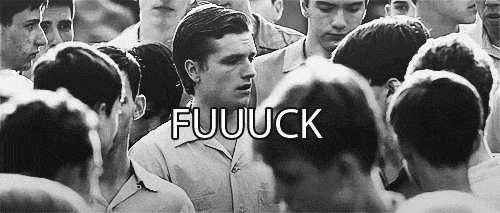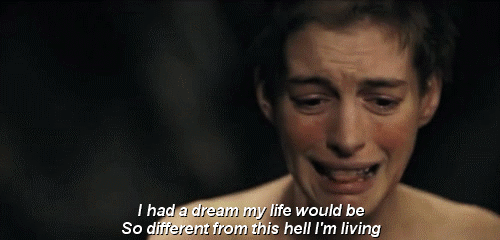In one of those fun-themed TED talks, Marco Tempest displays a new type of magic trick. He uses both traditional card tricks as well as technology to add a new spin to what used to be possible.
Mean Girls
It’s almost 10 years later and I’m still learning things about Mean Girls. This Thought Catalog article provides some interesting factoids about the movie. Reminded me of a literary analysis in a way ![]()
Looking to Lose Weight?
Hack College featured a funny article yesterday that, though humorous, is probably the most effective dieting strategy ever. If you’re looking to lose weight, why not try doing it like the Honey Badger? That being said, sometimes when the Honey Badger wants something, he really has to work for it; if you really want to lose weight, you might really have to work for it too…
On Affirmative Action
In response to a recent post on the Thought Catalog, I personally believe, at least currently, that affirmative action is detrimental. I think that admission to a school should be merit based. If your grades and extra-curricular activities are good enough to admit you to a school, I don’t think you should have to cross your fingers that your place at that university may be taken away by someone who is getting in for a reason that is unrelated to academics.
I understand that this is a controversial topic. I understand that people’s circumstances can put them in positions that are unbelievably unfavorable with respect to getting admitted to some schools. I understand that affirmative action intends to help relieve some people from these unfortunate circumstances.
However, I do not think that affirmative action is the best response to these circumstances. Not only does affirmative action take a seat away from a deserving student, but it is also a statement to the affirmed individual that there is a backdoor in life. Admission to school may not be the only difficult encounter they experience in life; showing them an easier alternative to hard work and persistence may not be the best option for the long run since the hard road will likely be the most likely road at some point in the future.
Different circumstances will often make certain things for some people to obtain. But we do not give out an extra 10% to students who cannot afford private tutoring. We do not give grocery discounts to people who are in lower income brackets. We do not choose to hire younger workers who have yet to build up valuable and relevant experience when a more senior, experienced worker is available.
This does not mean that the student who cannot afford private tutoring is unable to get higher marks than the student who can. This does not mean that people in lower income brackets are unable to purchase groceries. This does not mean younger, inexperienced workers are doomed to a lifetime of unemployment.
What this means is that some people have to work harder to achieve what others struggle less to achieve. Some people have to work longer to achieve what others can achieve in less time. Some people have to have more motivation and drive simply to keep up with the regular states of others.
But we’ve never before questioned this. Life has never been fair, and probably never will be fair. But we’ve always dealt with it up until now.
In conclusion, at least as I currently see it, affirmative action neither fixes a problem nor betters the system. I don’t think it is a beneficial strategy to implement or keep.
What do you guys think?
Congratulations! You Are Not Dead Yet
HULK SMASH. HULK SMASH BASS
ROFL

BEST ORCHESTRA COSTUMES EVER
Stephen Covey’s The 7 Habits of Highly Effective People
 The 7 Habits of Highly Effective People: Powerful Lessons in Personal Change by Stephen R. Covey
The 7 Habits of Highly Effective People: Powerful Lessons in Personal Change by Stephen R. Covey
My rating: 4 of 5 stars
The 7 Habits of Highly Effective People is a personal development book written by Stephen Covey. A fairly long read, this book covers in some depth 7 habits that Covey articulates to be important for the development of an individual from dependence on other to interdependence. In addition to the writing, the book also includes several exercises for people who are looking for ways to implement the habits in their own lives.
The 7 habits are:
1. Be Proactive
2. Begin with the End in Mind
3. Put First Things First
4. Think Win/Win
5. Seek First to Understand … Then to be Understood
6. Synergize
7. Sharpen the Saw
I liked the ideas presented in the book, and the order in which they were presented. The first habit, Be Proactive, is essentially you do not control what happens to you, but everything that you are you control; you may not control the universe, but you can control how you respond to the state the universe is in. The second habit, Begin with the End in Mind, is making sure that you are doing the right things (it doesn’t matter that you’re getting stuff done unless you’re getting the right stuff done. Your employer isn’t going to pay you for doing somebody else’s work if it involves neglecting your own). That being said, once you know what should be done, the third habit, Put First Things First, looks at how to accomplish everything that should be accomplished. These three habits are described as moving from a state of dependence to independence. That is, they are presented as how to better live life as an individual.
The next three habits deal with moving from independence to interdependence. In other words, they examine how to better deal with other people. The first of these three habits, Think Win/Win, states that when making decisions, both parties involved should win, or no deal can be made. It is a difficult thing to do, I agree, but there are obvious benefits to be had by eliminating a losing party from social transactions. The next habit, Seek First to Understand … Then to be Understood, deals with communicating with other people. Evidently, it deals the ancient wisdom that you should listen to others before saying your own piece (and it’s important to differentiate between listening and hearing here–simply waiting for someone to finish their piece before starting your own completely overlooks what this chapter has to offer). The last habit, Synergize, looks at how working together can have emergent benefits. In other words, it is an examination of how multiple parties working together can produce something that is greater than simply the sum of its parts.
The last habit, Sharpen the Saw, simply looks at how to maintain one’s health, habits, etc. It is an attempt to keep everything together by bringing back the big picture in times when focus may be elsewhere.
I personally thought that this book has quite a bit to offer, and I thought the presented tools can be quite useful. I have yet to seriously explore many of them, but I intend to do so soon. Hopefully I will update when I start to explore this book in more detail.
Let’s Talk Science
Looking for an opportunity to teach science? Why not help out high school students from Britannia Secondary School complete a science fair project? Join UBC’s Let’s Talk Science team to help ignite a passion for science in some of Vancouver’s upcoming academics! For more information and to register, please visit http://ubclts.com/mentorship.
Meeting People vs. Making Friends
I’m assuming that by now everyone has heard of whatweshouldcallubc.tumblr.com; I discovered it last week and went through the whole thing. Something that stuck out to me was a post about how people are “dying of loneliness”, and there was at least one other consisting of upper year students also saying how they’d only just found their place or still haven’t.
It made me think about how 1) it’s very common to not find your niche immediately as some people feel they should, and 2) how it’s very common for various organizations on campus to shove lots of ways to meet people down your throat and saying “Yes making friends is so easy here, you’ll have a group in no time.” Because seriously, meeting people and making friends with people are two very different things.
Some good ways of meeting people include:
- Introducing yourself to the people you sit near in your classes.
- Attending residence/AMS events.
- Hanging around in common areas, if you’re in residence.
- Joining an intramural team, or participating in other UBC REC events.
- Joining a club.
- Chatting up random people in line for Starbucks or at the bus stop.
- Wearing a nerdy t-shirt. It’s amazing how many nerds who love the same stuff you can attract.
It’s true, the above list is slightly skewed towards on-campus students. It’s an unfortunate fact, but if you want to meet people as a commuter, you have to put in effort. It evens out in the end though, because here’s the thing about making friends: it takes effort. Except for a few exceptionally outgoing individuals who are certainly not me, meeting someone does not equal being friends with them.
Some good ways of making friends with people (a skill that I am always trying to improve upon):
- Initiate conversation. I know you want them to start talking to you, that you want to feel like they like you, but realistically they’re probably sitting there thinking the same thing. And if you don’t speak up, no one will. And friendships generally aren’t born out of silence. (Not good at speaking to other humans? Start with, “Hey, how are you?” And ask questions. Ask them about their weekend, any exciting plans coming up, ask them about themselves, their preferences. Don’t give up, it takes practice.)
- Arrange a time to meet up where you can have some solid get-to-know you time. The five minutes before class starts does not count. Go for coffee, have a movie marathon in your dorm room, explore downtown, see a concert you’re both interested in, a one-on-one study session. Or it could be a group thing, too.
- Get their number and text them. Don’t be creepy or obsessive, but some casual banter can keep you on their radar and if you’re scared to ask them to hang out it can take some pressure off.
- Do/say nice things. People like people who make them feel good. Again, don’t paint their name on the side of the clock tower, but compliments and remembering their birthday or saving them a seat can go a long way.
- Meeting people and making friends go together best when you meet people in a place where you’re doing something you’re interested in; lots of the time they have the same mindset as you and you’ll have something to talk about and do together.
It kind of sounds like I’m giving dating advice here, but honestly, a good friendship takes nearly as much effort as a romantic relationship. If you don’t go out looking, most of the time, it isn’t going to land in your lap. Lots of people I know have made friends through their classes, and I met most of my friends through residence and knitting club. It’s not guaranteed that you’ll click with every person you make an effort to talk to, but if you never try, then you’ll never know. Just keep trying, because your kindred spirit is out there, looking for you too.
Overinvolved Student Problems
Every year since second year of university, this process always happens to me. Every. Freaking. Year. Let me explain through the magic of gifs:
1. Classes are so interesting! Way better than what I was learning last term.

2. So much free time. I should join a bajillion clubs on Clubs Day.

3. After joining a bajillion clubs and forking a lot of money to said clubs.

4. I’m so inspired to do more for other people and the community. I should apply for a position or two (or three…or four…).

5. Damn, so excited to be [insert position title] at [insert organization name] doing [insert job description]!

6. Repeat #5 2-4 times.

7. Proceed to spending all my free time doing #5 and #6.

8. Ehmegawd kill me now, I have no time.

9. Commit seppuku.

As time progresses, I’ve discovered this is what is called “Student Leader Problems.” Don’t believe me? There’s a Twitter account for that.
Now after 3 years of university, I’ve discovered what I am truly passionate about instead of doing random things because it peeks my interest just a tiny bit. Now I’ve broadened to organizations outside of UBC and they are even more exciting and incredible than the ones on campus.
So far my involvement schedule includes:
- Two jobs: Hollister and the English Language Institute. Both of are awesome jobs and I’m really glad I’m working with great people.
- 5 courses: 4 psychology and 1 business.
- Involved with a few school clubs, like CVC and Right to Play.
- 1 volunteer opportunity that is in the works, but one that I am so passionate about. I’ll blog about it as soon as I get it secured.
- A mentorship/connectorship program with the Burnaby Board of Trade.
- Dragonboating with Dragon Heart. So addicting, it’s crazy.
And things were going great…
Until I found out I had 9 midterms, 5 finals, and 3 papers.
At first I was like

Then I was like

And then this happened

And this is me now

That’s a total of 14 exams this semester. I’ve had midterms since late September and they last until mid-November, not to mention having 2 midterms and a paper on the same day and 2 finals on the same day. I’m just on the edge of my seat every day and my Google calendar looks a rainbow threw up on it.
The good thing about this, and this took me awhile to figure out because it felt like hell at the beginning, is that I’ve learned that I don’t procrastinate as much. Truth be told, I don’t have time to procrastinate. It’s not that I’m super efficient now, but I’ve learned to manage my time better.
Here are some tips that I’ve been doing that have pretty pretty effective:
- Know your limit.
Although I would love to be working a lot with international students while making some sweet money too, I know that school is more important at this point. The first thing I did when I noticed I was falling behind was cutting back my hours at work. Then I was able to study and do homework in between classes instead of staying up until 3 in the morning. Don’t overexert yourself. - Use a calendar.
I can’t stress this enough: as much as you think you can fit you can organize your life like an Ikea catalogue in your head, it’s so much easier when it’s laid out in front of you. At first it’s stressful seeing all that you have to do, but it’s the first step to success. Then you can arrange meetings in between classes or reschedule appointments until you have a break in between exams or papers. - Don’t be a party animal.
As much as I’d love to go to all the cool events happening around me, I really can’t. I pick and choose things I find I absolutely want to go to and leave behind things that aren’t as important. It’s a hard thing to do because all your friends are going, but you have to value what you think is most important. For me, that’s school right now. Plus, you get to save some money from conference fees, entry fees, and booze money.
To everyone who’s having similar to problems or just time management in general, how do you manage it all? I’d love to hear how you are being awesome and how you deal with it. Please leave a comment below and share some ideas!
This blog post is inspired by #whatweshouldcallubc and if it not for the genius behind that blog, I would not be able to complete this post. I have no idea what ninja skills he/she has to find all these gifs. *slow applause*
